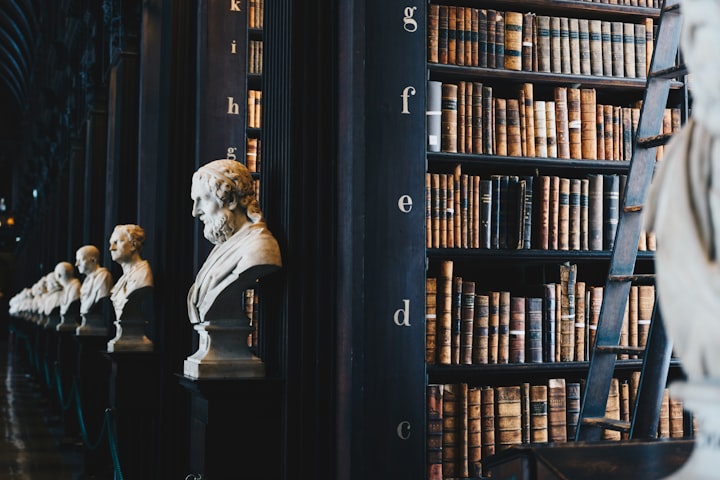How accurate are history books?
History books must be evaluated with the same critical eye we use to evaluate news reports and other forms of historical evidence.

History is the study of the past. It's something that we have been doing for years. All around us we are surrounded by artifacts from different times and places, from different people. This is what we have to build our history to prove that certain things happened. Are history books accurate?
Yes, in some cases, but no, in others. History books have bias just as every other source does. And remember this, without bias there would be no good vs evil.
Whether or not we can trust history books depends on how authoritative the author is
The answer to this question depends on what you mean by "history book." If you are asking whether or not the information in a history book is accurate, the answer is yes and no. As with any other type of writing, there are different degrees of accuracy—some history books are more reliable than others.
Historians have been coming up with new ways to study and write about history for thousands of years. Today, historians use many different approaches to studying the past. Some historians focus on one aspect of history and try to understand it in depth—for example, they might study how people in ancient Rome felt about their government or how women lived during World War II.
Other historians study how things change over time—for example, they might look at how slavery changed over time or how technology has changed since the Industrial Revolution. Some historians use scientific methods to study history, while others rely on more traditional approaches like reading documents and interviewing people who lived through important events in history.
Some historians even combine these two approaches by using scientific methods to better understand historical documents written long ago. Whether or not we can trust history books depends on whether or not we trust the author's authority on the subject matter being discussed (e.g.
History books written by authors who were eyewitnesses to events are more reliable than those written by people who weren’t there.
History books have been around for centuries and have always been a source of information about the past. They tell us about people, places, and events that have happened long before we were born. History books can be very accurate or they can be very inaccurate. The accuracy of a history book depends on the author’s ability to write down what he has seen or heard about an event.
History books written by authors who were eyewitnesses to events are more reliable than those written by people who weren’t there. If you read a history book that was written by someone who was alive when an event happened and saw it with their own eyes, then you know that what is being said is accurate.
However, if you read a history book that was written by someone who wasn’t there, then you don’t know if what he says is true or not. There are different kinds of history books: biographies, autobiographies, fiction stories based on real people or events, etc..
The truthfulness of a historian’s account can be verified by other reliable witnesses
History is a collection of stories about the past. These stories are told by people who were there and by people who weren’t. The truthfulness of a historian’s account can be verified by other reliable witnesses, such as other historians or eyewitnesses. A historian’s job is to try to explain why things happen the way they do.
Historians use primary sources to find out what happened in history and how it happened. Primary sources are documents that were created during the time period being studied. Examples of primary sources include letters, diaries, speeches, newspaper articles and photographs. Secondary sources are books written later about the topic being studied.
These books often use primary sources as evidence for their arguments but they also rely on research done by other historians over time. Historians use different methods to study history including archival research and oral history interviews with those who experienced historical events firsthand.
Accounts written years after the events they describe are less reliable than those written shortly afterwards.
The answer to this depends on what you mean by "accurate." Accounts written years after the events they describe are less reliable than those written shortly afterwards. If a historian is writing about recent events, he or she can interview eyewitnesses and check their accounts against any available records and documents.
A historian who writes about ancient times cannot do this. The historian must rely on the accounts of other people who have written about those times — accounts that could be hundreds or even thousands of years old. These accounts are often biased in favor of certain people or groups, so it's not surprising that historians disagree about many things in history books.
In addition, historians can only make educated guesses (or "hypotheses") about what happened long ago based on evidence they find today. For example, archaeologists may dig up old bones and try to figure out what kind of animal they belonged to. This is an educated guess because there are no witnesses left to tell us exactly what happened thousands of years ago when those animals roamed the earth.
So yes, history books can be inaccurate — but not necessarily because they're lies or exaggerations told by liars!
In conclusion
The answer is yes. They are accurate. History books are written by historians and are meant to be historically accurate narratives of the time period they cover. Of course, some famous history books can be controversial in their own right and cause more argument than others do. If you find a history book that interests you, check it out for yourself.
What's more important than accuracy, however, is common sense: question everything in history books, not just what you don't agree with; look at all the evidence when analyzing sources; and use a Historical Method to evaluate the information presented to you.
About the Creator
Hector Allemand
📒 Passionate about writing! 😍 Fan of the history, outdoors, dogs, dancing and music. 🤔 life is too short to not write...






Comments (1)
Hey! Thanks for sharing this nice and interesting post? For me as for the history and book lover it was pretty pleasant to read it.